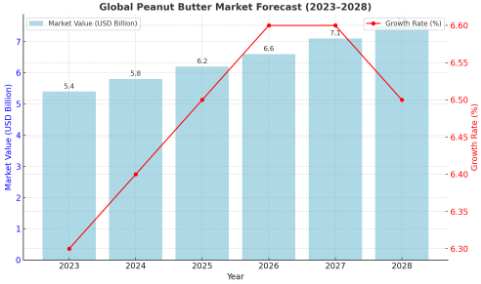Peanut Butter Manufacturing Business is now a staple food in many countries around the world. The high nutritional value and protein content of peanut butter have made it popular not only among households but also in the hotel, café, restaurant, and fitness industries. The peanut butter business offers a great opportunity for startups and aspiring entrepreneurs. Growing health consciousness, increased demand for foods rich in protein, and expanded retail and ecommerce channels have all contributed to the growth of this market segment.
This article is a comprehensive guide for entrepreneurs who are considering starting a peanut butter manufacturing company. This article explores global trends, demand predictions, key players, and an outline of the manufacturing process. It is presented in a human-friendly, detailed manner to assist you in making informed decisions.
Peanut Butter Market Outlook
The rising health consciousness among younger generations and millennials is a major factor. They see peanut butter as an alternative to high-calorie spreads that are rich in protein. The use of peanut butter in confectionery, bakery, smoothies and other products further diversifies its consumption.
Global Peanut Butter Market Outlook (2023-2028).
| Year | Market Value (USD Billions) | Growth Rate (%) |
|---|---|---|
| 2023 | 5.4 | 6.3 |
| 2024 | 5.8 | 6.4 |
| 2025 | 6.2 | 6.5 |
| 2026 | 6.6 | 6.6 |
| 2027 | 7.1 | 6.6 |
| 2028 | 7.5 | 6.5 |
Demand is particularly strong in North America, Europe and Asia-Pacific, where peanut butter is a staple food for decades. However, Asia-Pacific has seen accelerated growth, due to urbanization, increased disposable income and the adoption of Western eating habits. India is experiencing double-digit growth, mainly due to the popularity of this product among fitness enthusiasts, young urban people, and professionals.

Related: How to Start a Profitable Groundnut Processing Business
The drivers of growth and rising demand
Peanut butter consumption is largely driven by the trend towards healthier snacks. Peanuts are a great source of vitamins and minerals, as well as protein. Today, consumers prefer plant-based proteins to animal-based ones. Therefore, peanut butter is widely used by fitness enthusiasts and athletes in high-energy snacks, shakes, and sandwiches.
The increasing availability of peanut butters in different flavors, including honey-roasted, crunchy, and chocolate, has broadened the market. Manufacturers are also increasingly focused on sugar-free and preservative-free variants in order to appeal to health-conscious buyers. E-commerce is a game-changer, as it allows brands to directly reach consumers with a variety of product offerings.
Peanut Butter: Key Players on the Global Stage
The peanut butter industry is dominated primarily by large multinational companies, but several regional players cater to niche markets. Here is a list with the major players in the world:
| Company Name | Country | Highlights |
|---|---|---|
| Smucker Company, J.M. Smucker Company | USA | Popular Jif brand is among the biggest in the world |
| Hormel Foods Corporation | USA | Skippy peanut butter is a popular product in many countries |
| Unilever (Best Foods), | UK/Netherlands | Manufactures peanut butter under multiple FMCG labels |
| ConAgra Brands | USA | Famous for Peter Pan Peanut Butter |
| Algood Food Company | USA | Retail and Foodservice Industry Supplies |
| Kraft Heinz Company | USA/Canada | Kraft peanut butter is the market leader in Canada |
| Olam International | Singapore | Peanuts are a major player in the global peanut processing and sourcing industry |
| Lotus Bakeries | Belgium | Spreading peanut and nut butters throughout Europe |
| Alpino Health Foods | India | A rising Indian brand aimed at health-conscious consumers |
| Pintola | India | Brand focused on organic and natural peanut butters. |
This competitive landscape provides regional startups with the opportunity to differentiate themselves by offering unique selling propositions, such as organic certification, new flavors or fitness-focused products.
View our Books for more information
Peanut Butter Manufacturing Process
Production of peanut butter involves a simple but tightly controlled process, which ensures consistency, quality, and food safety. The standard manufacturing process is described below in detail.
- Raw Materials Selection and Cleaning
First, the highest quality peanuts are purchased, cleaned, and inspected. Afterward, stones, shells, or other foreign materials are removed with mechanical cleaners and blowers. - Roasting
To bring out flavor and reduce moisture, peanuts are roasted to a controlled temperature (160-170 °C). Roasting increases shelf life. - Cooling & Blanching
After being roasted, they are quickly cooled and blanched to remove the skins and separate the kernels. The abrasion or heat method can be used to blanch. - Grinding
To achieve the desired texture, the peanuts are ground at different stages. The initial grinding creates a medium-coarse paste. This is followed by a finer grinding to achieve smoothness. - Mixing ingredients
Ingredients such as salt, sugar, and stabilizers are added at this stage. Honey, chocolate, or spices can be added to flavored varieties. - Homogenization
To ensure consistency and stability, the paste is homogenized. - Packaging
The peanut butter is packed into jars and sealed. Modern lines use nitrogen flushing and vacuum sealing to keep the peanut butter fresh.
The process of food safety and hygiene is critical. This requires strict adherence to standards like FSSAI, ISO 22000, HACCP, and US FDA Guidelines.
Related: Start your own Manufacturing Business of Creamy Peanut Butter
Entrepreneurship and Startups: Opportunities
Peanut butter offers a wide range of opportunities to startups that can create new flavors, products, and healthier alternatives. For example, developing sugar-free, vegan, or organic-certified products can appeal to niche audiences. Branding peanut butter as a fitness supplement with high levels of protein instead of a simple spread could capture the growing sports nutrition market.
Exports are another promising route. The Middle East and Asia are showing an increasing demand for peanut butter. Entrepreneurs can take advantage of India’s abundance of peanut cultivation to gain a competitive edge. Moreover, smaller packs aimed at price-sensitive customers in emerging economies could help penetrate new markets.
Role of Technology and Innovation
Automation of roasting, grinding and packaging reduces costs and maintains consistency. Consumers on the go are also becoming more interested in smart packaging, such as resealable containers and portion packs. Fortified peanut butters with added vitamins, minerals or plant protein, and flavored varieties are changing the category. They also attract younger demographics.
R&D is also a key component of product diversification. Entrepreneurs who focus on peanut products with added value, such as peanut oil, peanut flour, and ready-to-eat snacks, can create multiple revenue streams using the same production line.
Why this business is sustainable
The peanut butter industry is sustainable, as it takes advantage of a product that’s widely available and caters to the growing trend in health and wellness. Peanut butter is a staple food in many countries around the world. The versatility of peanut butter in both sweet and savory recipes ensures its continued popularity. The relatively simple production process also makes it more accessible to startups than other food processing ventures.
How NPCS Helps Entrepreneurs
Expert guidance is essential for entrepreneurs who are interested in starting a peanut butter manufacturing company. Niir Project Consultancy Services (NPCS) provides Market survey cum Detailed Techno-economic Feasibility reports to provide in-depth insights. The reports contain detailed information about the manufacturing process, raw materials and plant layout as well as the financial needs for such projects. NPCS is a trusted industrial consultant that helps entrepreneurs and startups evaluate the feasibility of establishing a new industry or business.
Discover the Right Business for You With Our Startup Selector Tool
The conclusion of the article is:
A peanut butter manufacturing company is a great opportunity for entrepreneurs. The rising global demand and health-conscious consumers, as well as the relatively simple production process, make it a very attractive business. There is plenty of room for large companies and agile startups, as consumption in developed and emerging markets continues to grow. The success of this business depends on the innovation of flavors, quality control and market positioning.
Entrepreneurs can create sustainable and profitable ventures by understanding the market trends, adhering strictly to manufacturing standards and using expert consultancy.







